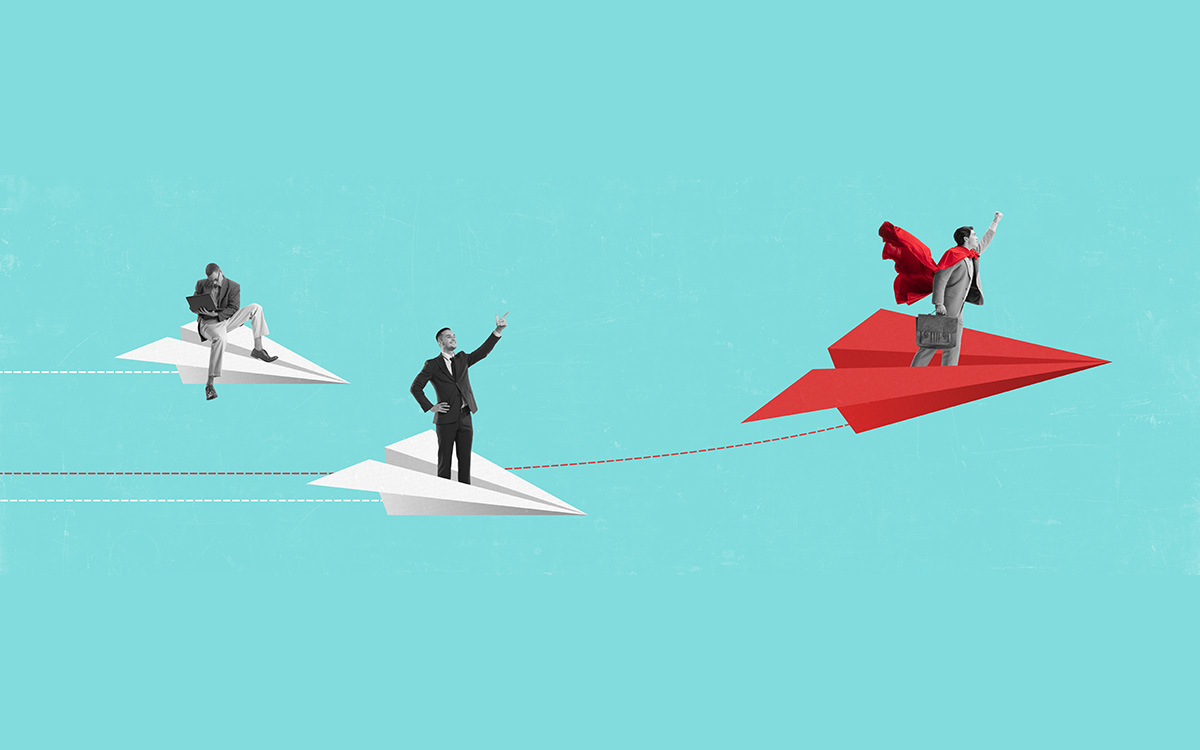What is your five-year plan? Prospective employers often ask job candidates this question to get them to outline their professional goals. But for many people it will feel increasingly difficult to see that far into the future, given the transformation and uncertainty in their professional lives today.
Immense changes are already impacting a wide range of jobs across industries, such as a new wave of “generative” artificial intelligence (AI) systems that could potentially displace swathes of personnel — even well-paid white-collar workers in areas such as media and education.
At the same time, wider societal challenges are also changing the job market, not all of them negatively. Reducing threats to the environment is seen as an economic opportunity, with new career paths emerging to tackle the climate crisis amid growth in demand for so-called “green skills”.
Short of a crystal ball, we cannot know for certain how these global forces are going to shape the future of work. Indeed, it is likely that many jobs of the future don’t exist yet. So how can you find a meaningful way to plan for the years ahead, and manage the ups and downs along the way?
To provide some steps that you can take to prepare for the uncertain future, we spoke with ESCP’s Laëtitia Langlois, sustainability manager, and Peter Stephenson-Wright, UK director of corporate relations and careers services.
Skills like problem-solving and critical thinking — all of that will be quite useful. Knowledge will be the least valuable thing, as it’s being commoditised by technology.
Peter Stephenson-Wright

Embrace flexibility and adaptability
First and foremost, Stephenson-Wright says you must recognise that the career landscape is evolving rapidly. So embrace a mindset of flexibility and adaptability, be open to new opportunities, and be willing to learn and acquire new skills as needed.
“Skills like problem-solving and critical thinking — all of that will be quite useful. Knowledge will be the least valuable thing, as it’s being commoditised by technology. So you need the right set of attitudes — mindset — and the understanding that nothing is predictable anymore,” he says.
You must stand ready to make significant shifts in your career trajectory. And that means not being afraid of taking risks and accepting a fair amount of redundant effort — pursuing career paths that may amount to nothing because of how quickly employer demands are changing.
That may seem gloomy, but Stephenson-Wright assures us that it is quite necessary to accept the reality and take steps to navigate it.
For one, consider developing an “entrepreneurial mindset” — cultivate skills such as creativity, innovation, and resourcefulness. These are “transferable skills” that can be applied across industries and job roles. So rather than specialising in a narrow field, such skills as problem-solving, adaptability, collaboration, and communication, will be valuable regardless of the specific career paths you choose.
Hone ‘transferable skills’ that AI cannot easily replicate
Such abilities will become ever more important as generative AI systems such as ChatGPT begin to shake up work in several significant ways, our expert tells us:
“A whole set of skills will be made redundant. It’ll be like when the pocket calculator arrived in the late 1960s, which eliminated the need for manual calculations. AI is the same, in terms of the ability to pull together knowledge. It’s going to do a lot of the heavy lifting for a lot of professions, but what can we do with the saved time? We need to put more emphasis on the things AI cannot do — form an opinion, develop a strategy, be creative and innovative,” Stephenson-Wright says.
So it seems likely that some jobs or tasks will go because of AI. But it’s the uniquely human skills people should be focusing on to ultimately use the technology to improve their productivity.
People need to realise that climate change is not happening 20-30 years out, it’s going to impact their careers much sooner.
Laëtitia Langlois

Develop sustainability expertise: a basic job requirement
Alongside AI, another immense challenge that is driving change in the job market is climate change. Not only are many people, especially younger professionals, wanting to use their careers to help address environmental problems, but the opportunities to do so are increasing rapidly as well. According to LinkedIn, jobs linked to renewables and the environment have more than tripled in the past five years in the US alone, while global job postings for roles with “green skills” such as environmental accounting have grown 8% each year over the same period.
For Langlois, this highlights not only the creation of new jobs but also the transformation of existing roles because of the impacts of climate change. “Sustainability expertise is fast becoming a requirement for even traditional roles in business,” she says. “Think about logistics managers — they are having to reduce the carbon footprint along the supply chain. People need to realise that climate change is not happening 20-30 years out, it’s going to impact their careers much sooner.”
The mindsets, skills and knowledge acquired during formal education may become outdated or insufficient over time due to societal changes.
Laëtitia Langlois
Stay informed, cultivate a learning mindset
For this reason, Langlois says you should keep yourself updated on the sustainability landscape. Follow the news, attend conferences or webinars, and network with professionals. But also, seek opportunities to develop new skills and knowledge through online courses, workshops and certifications. “There is a need for life-long education, because the mindsets, skills and knowledge acquired during formal education may become outdated or insufficient over time due to societal changes,” she says.
As an example, she underlines the importance of a basic understanding of the science of climate change, so that individuals can think about how their work is affecting the planet and how to reduce that environmental impact.
With climate regulation coming in thick and fast, Langlois says some professionals may look at avoiding companies or roles that are not serious about tackling climate change, too.
Ultimately, planning for a career in an uncertain future can be difficult, but these are just some of several strategies you can adopt to make informed decisions. Stay open to new possibilities, be proactive in your professional development, and be prepared to embrace change as new challenges and opportunities arise.
License and Republishing
The Choice - Republishing rules
We publish under a Creative Commons license with the following characteristics Attribution/Sharealike.
- You may not make any changes to the articles published on our site, except for dates, locations (according to the news, if necessary), and your editorial policy. The content must be reproduced and represented by the licensee as published by The Choice, without any cuts, additions, insertions, reductions, alterations or any other modifications.If changes are planned in the text, they must be made in agreement with the author before publication.
- Please make sure to cite the authors of the articles, ideally at the beginning of your republication.
- It is mandatory to cite The Choice and include a link to its homepage or the URL of thearticle. Insertion of The Choice’s logo is highly recommended.
- The sale of our articles in a separate way, in their entirety or in extracts, is not allowed , but you can publish them on pages including advertisements.
- Please request permission before republishing any of the images or pictures contained in our articles. Some of them are not available for republishing without authorization and payment. Please check the terms available in the image caption. However, it is possible to remove images or pictures used by The Choice or replace them with your own.
- Systematic and/or complete republication of the articles and content available on The Choice is prohibited.
- Republishing The Choice articles on a site whose access is entirely available by payment or by subscription is prohibited.
- For websites where access to digital content is restricted by a paywall, republication of The Choice articles, in their entirety, must be on the open access portion of those sites.
- The Choice reserves the right to enter into separate written agreements for the republication of its articles, under the non-exclusive Creative Commons licenses and with the permission of the authors. Please contact The Choice if you are interested at contact@the-choice.org.
Individual cases
Extracts: It is recommended that after republishing the first few lines or a paragraph of an article, you indicate "The entire article is available on ESCP’s media, The Choice" with a link to the article.
Citations: Citations of articles written by authors from The Choice should include a link to the URL of the authors’ article.
Translations: Translations may be considered modifications under The Choice's Creative Commons license, therefore these are not permitted without the approval of the article's author.
Modifications: Modifications are not permitted under the Creative Commons license of The Choice. However, authors may be contacted for authorization, prior to any publication, where a modification is planned. Without express consent, The Choice is not bound by any changes made to its content when republished.
Authorized connections / copyright assignment forms: Their use is not necessary as long as the republishing rules of this article are respected.
Print: The Choice articles can be republished according to the rules mentioned above, without the need to include the view counter and links in a printed version.
If you choose this option, please send an image of the republished article to The Choice team so that the author can review it.
Podcasts and videos: Videos and podcasts whose copyrights belong to The Choice are also under a Creative Commons license. Therefore, the same republishing rules apply to them.





